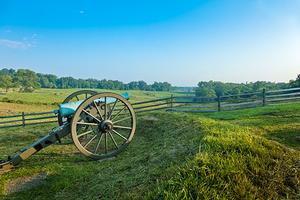Research
Professors Link Relevance of Civil War to Political Debate Today

The Civil War may have been more than 150 years ago, but AU School of Public Affairs Associate Professors Alan Levine and Thomas Merrill say many of the questions at the heart of the conflict remain unresolved and relevant today.
Their new book, "The Political Thought of the Civil War," published by the University of Kansas Press is a collection of 14 essays that Levine and Merrill co-edited along with James Stoner, Jr., from Louisiana State University. Many of the volume’s chapters originated as lectures delivered at the SPA Political Theory Institute between 2011 and 2015. Authors include leading scholars in political science, history, and literature, examining crucial debates of the Civil War era.
“It’s so easy in Washington, D.C., to get caught up in the controversies of the day and to have all your partisan passions engaged by who is winning and who is losing right now,” Merrill says. “To understand what’s going on behind the scenes today, you need some historical perspective.”
Using a deliberative approach, the authors analyze the words and actions of political actors from the era, including William Lloyd Garrison, John Calhoun, Abraham Lincoln, and Frederick Douglass, with reference to the American Founders and the architects of Reconstruction. The book includes a chapter by Levine on racism and slavery.
“Many people today feel like the country is on the verge of civil war, and it’s important for us to know what real civil war actually is and to see the way in which our divisions today are still rooted in the Civil War,” Levine says. “Leading up to the war, the war itself, and aftermath —those questions that have not been sufficiently digested by the polity and been dealt with — they are stuck in our throat.”
For people in the 1850s who thought slavery was a grave moral wrong, Merrill says the book revisits the options they had to act in the polarized politics of the time. While the look back doesn’t necessarily tell readers today what to do, it does prompt reflection on the serious dilemma that many faced then and issues of racism that the country is still grappling with today.
It was only after the book project began that there were widespread controversies over tearing down confederate statues, but Merrill and Levine say it’s not surprising given some people still sympathize with the confederacy. “The Civil War is by no means a dead issue in many places,” says Merrill.
The book asks readers to confront and think through a moral dilemma. “How do we live as persons of integrity in a world that is deeply problematic?” Merrill asks. “How do we balance our aspirations to live in a just society against the danger of civil war? There may not be any easy answers to these questions, but we owe it to ourselves to face up to them.”
